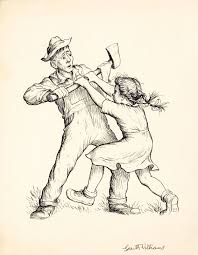- I write quickly. That is, I move my fingers at a frantic pace across the keys or sloppily jot ideas in a hybrid of cursive and print to get ideas that flow at lightning speed onto screen or paper. OR
- I write quickly. That is, for a short period of time, maybe only a few minutes.
So which is it?

In the words of my friend Forrest:
I think maybe it's both. Both things is happening at the same time.
This is the point where the act of writing to learn is enhanced when we pause to reflect on how we learn to write in this way. I look at the comments section for Quick-Write Tuesday and can't help but notice that everyone seems to know just what to do. Just how do we learn to write this way? What are the critical attributes for a quick write? Take a look at the attributes identified in Content-Area Writing in the Wordle on the right.
It seems like a quick write is, by definition, not something then we could find in a published mentor. However, if you consider a quick write as stream of consciousness--the kind of writing the main character in Extremely Loud and Incredibly Close uses to tell his story--you'll find some ways to enhance your own and those of your students. Take a look:
Isn't it so weird how the number of dead people is increasing even though the earth stays the same size, so that one day there isn't going to be room to bury anyone anymore? For my ninth birthday last year, Grandma gave me a subscription to National Geographic, which she calls "the National Geographic." She also gave me a white blazer, because I only wear white clothes, and it's too big to wear so it will last me a long time. She also gave me Grandpa's camera, which I loved for two reasons. I asked why he didn't take it with him when he left her. She said, "Maybe he wanted you to have it." I said, "But I was negative-thirty years old." She said, "Still." Anyway, the fascinating thing was that I read in National Geographic that there are more people alive now than have died in all of human history. In other words, if everyone wanted to play Hamlet at once, they couldn't, because there aren't enough skulls!" (pp 13-14).
And though I know the author (Jonathan Safran Foer) and his editor(s) did much polishing on a paragraph like this, it gives me a mentor to get stream of consciousness going (responding to something I've seen or heard or--in this case--read) and then--more importantly sometimes--how to keep it flowing (with words like "anyway" to get back to the topic and "in other words" to add clarity). So, let's give it a try. I'm going to time myself for two minutes and quick write on the topic of....you guessed it! Quick Writes:
I think of all the times I've been asked and have asked others to engage in a quick write. What am I really asking them to do? Sometimes activate their background. Sometimes synthesize or summarize their learning so far. Often times we come back to it (though sometimes we run out of time!) we come back to it to see what about our initial thinking was confirmed, challenged, or off topic...In other words, a quick write is a way of solidifying, making my thinking visible so that I can find my focus so that I can put what I'm thinking into...
(And the timer goes off). I SOOOOOO badly want to finish, and there at the ellipsis, I totally got off track. My daughter came racing through the room and all my trains of thought were derailed. So, I used a line from the mentor above..."In other words" and got myself going again. Going just enough to get frustrated when the timer went off, but now I have a few ideas that might help me to engage in conversation with others, to generate a formal definition, to reflect on the purpose for the quick writes I've used or to begin drafting for the November Ed Leadership deadline. I could also go back and harvest an idea (like quick writing to activate background knowledge) and engage in two more minutes to flush this idea out a little further (this is a strategy known as looping).
In any case, let's not assume that our students understand how to engage in this kind of writing. Let's be transparent that sometimes it doesn't get us very far. But let's not call it a quick write when what we've really done is polished the product and shrunk it to fit in a quick write form. In other words, writing is not like pulling a cake from the oven at the end of the cooking show. That makes writing look easy. And we all know from our own experiences, that writing--even quick writing--is anything but easy!Today's Try-It: Quick Write. In other words, stream of consciousness. Maybe you'd like to harvest an idea
- From this post
- From a Tom Hanks' flick (with two completely unintentional references in one post!)
- From a word that is standing out from your own summer vacation.
- From Tuesday Quick Write




